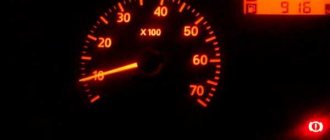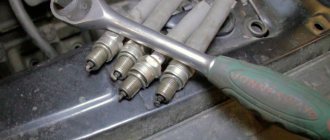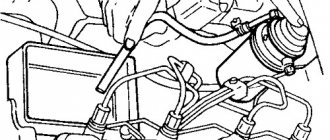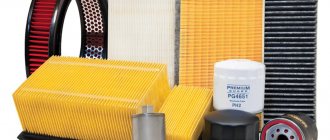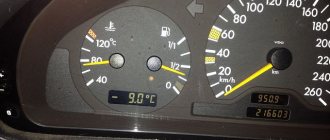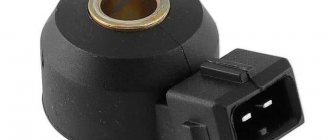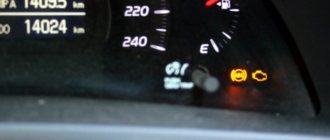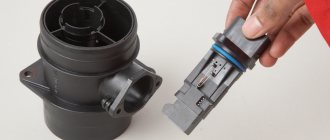Features of diesel engine operation
In gasoline units, a mixture of air and fuel is formed, which is injected into the cylinders using an injector. Once in the combustion chamber, the mixture is ignited by a spark plug and a working stroke occurs. Next – release, compression, then the cycle repeats. Unlike gasoline engines, in a diesel engine the mixture is ignited by high pressure. It will enter the combustion chamber using spray nozzles. In addition, the glow plug is switched on, which heats the fuel to the required temperatures.
But if they fail, the diesel unit is unable to start normally. The glow plug significantly simplifies the process of igniting the fuel and, accordingly, starting the engine. If the diesel engine does not, then the control relay is broken and the spark plug does not heat up the diesel fuel. The action of this element does not stop until the coolant temperature reaches operating values. The glow plug often saved car owners when starting the engine in winter.
We also note that, in addition to the ignition method, such engines differ in the design of the fuel system. And if gasoline ones have a simple submersible pump, here there are two of them: one of low pressure and the other of high pressure. Well, let's look at why diesel is not “hot”.
3) Compression
Compression is the maximum air pressure in the combustion chamber at the end of the compression stroke. Accordingly, if this pressure does not exist or is weak, then the desired explosion will not occur. On a car, it looks like this: when cold, the engine starts poorly or doesn’t start at all , starts back up (after a few turns the starter starts and eventually starts) and smokes white. At home, compression can be checked with a diesel compression meter, which is sold at any auto store. Compression in an engine with a common rail system should be: min 10 MPa – max 20 MPa. In addition, the compression in the engine should be approximately equal in each cylinder. Let's consider an example: if you measure compression in 3 cylinders, you have a compression of 15 MPa, and in one cylinder it is 7 MPa, then when cold the engine will throttle (work unstably) and smoke white). And if in all of them the compression is less than 10 MPa, then in the summer it will start after you, and in the winter you will not be able to start the car at all. At the same time, there will be no error records in the engine control unit! The engine malfunction icon (CHECK) will not light up on the instrument panel.
If there is no compression in the engine, the reasons may be the following:
A. Worn, broken or stuck compression rings:
— natural wear and tear during long-term use of the vehicle;
— engine overheating;
- low-quality fuel.
B. Cylinder head gasket burnt:
— natural wear and tear during long-term use of the vehicle;
— overheating of the cylinder head (cylinder head);
— Incorrect installation of the cylinder head in the service.
B. Cylinder head malfunction:
- leaking intake or exhaust valves (wear);
- crack in the cylinder head.
D. The engine ignition is set incorrectly.
Almost all of these reasons can be identified at home, with some knowledge of the engine structure and a little plumbing skills.
Compression
Initially, its level is two times higher than that of gasoline units. The mixture ignites under strong compression. And a drop in compression does not have the best effect on starting the engine. Since any compression process is accompanied by the release of thermal energy, the mixture does not heat up enough and is not able to ignite. If it is a car with high mileage, compression drops when the cylinder walls wear out and the rings burn out. Recall that each piston has three rings. Two are compression, one is oil scraper. This requires disassembly and repair of the engine. It happens that compression drops in only one of the cylinders. In this case, the diesel engine starts and stalls or troits. This means that one of the cylinders is not working or ignition occurs irregularly.
What is normal compression?
If for gasoline units this figure is from 9 kg/cm², then for diesel units the minimum value is 23 kg/cm². It is measured using a special device - a compression meter.
In this case, the starter must be turned for no more than 3-4 seconds, otherwise the battery will discharge. Already at the first “grabbing” the result will be visible. It will not change with further rotation of the crankshaft.
Glow plugs
Why won't the diesel start? The reasons may be hidden in the glow plugs. It is very simple to determine this breakdown - the car starts well only with a warm engine. “When cold,” the starter turns, but the engine does not start due to the unheated combustion chamber. Usually happens in winter.
Also, if the engine was able to start, it will work intermittently. If the diesel engine is bad, several glow plugs may have failed at once.
Why isn't the car .
The main reasons why a car does not start well when cold are:
Weak dead battery
This factor of poor engine starting is widespread! Frost leads to accelerated discharge of batteries.
- The vehicle can be started by replacing the battery with a charged one, or charging the existing one;
- if the car allows it. In this case, be sure to take into account the sequence of actions specified in the operating instructions.
Advice! If you doubt whether the vehicle will start in cold weather due to a dead battery, then you should understand that the battery will have the strongest charge only when you first try to start the engine. From the moment the car is opened with the key fob, processes that consume electricity are started in the system, so it is important to act quickly!
The greatest likelihood of starting a vehicle with a dead battery is:
- Standing next to the car, open it and immediately sit in the driver’s seat, turning on the ignition.
- Wait 2-4 seconds for all vehicle systems to activate.
- Turn the ignition key further, activating the starter and starting the engine.
Low spark level
The second, common case is a low level of sparking.
This may happen for the following reasons:
- when spark plugs fail;
- if the electrical connections of the ignition system are broken;
- when the ignition coils fail
In this case, it is necessary to identify the causes and eliminate the source of the malfunction that prevents the vehicle from starting when the engine is cold.
It is enough to replace the spark plugs and check all connections of the ignition system.
Filters
For what other reasons does a diesel engine not start? Of course, these are filters. It is necessary to check their condition.
There are two levels of purification in the fuel system of a diesel engine - coarse and fine.
The latter needs to be given special attention. The paper cavity of the filter, through which fuel passes to the nozzles, is capable of trapping particles up to 10 microns in size. The resource of this element is 8-10 thousand kilometers. If you do not follow these regulations, the filter will simply become clogged. As a result, fuel will not flow into the combustion chamber, although the pump produces the required pressure. This can be determined by the nature of the vehicle's movement. If there are dips in dynamics, this means that fuel is supplied with a delay. And it is the filter clogged with dirt that delays it. It is worth mentioning the air elements.
Such filters also require replacement. According to regulations, their service life is 10 thousand kilometers.
They are stored in a plastic case; you can replace them yourself by sliding the mounting brackets and removing the cover. The photo above shows what a dirty air filter looks like. Because of this, the diesel engine will not start. The oxygen supply stops or is reduced to a minimum level. The engine does not have enough air - it choke on fuel.
The causes of problems are improper care and improper operation of the diesel engine.
The most common reason why a diesel engine stalls is the car owner’s violation of basic operating rules. In addition, this may be influenced by failure to comply with the deadlines for carrying out preventive work. For example, due to the fact that diesel fuel contains a large amount of sulfur, the oil must be changed every 7.5 thousand kilometers. Oil can quickly oxidize and lose its performance characteristics, which negatively affects the condition of the pistons.
It is necessary to constantly and constantly pay attention to the cleanliness of fuel parts and promptly drain waste from the tank and filter. They should be cleaned at least twice a year to prevent filter clogging.
We recommend: Wheel rim repair
Pump
There are two mechanisms in the system. These are fuel injection pump and high pressure fuel pump. Often the first element fails, since its structure is more complex than that of the second. The pump cannot produce the required pressure in the fuel system, which is why the diesel engine does not start or starts with difficulty. The movement is accompanied by “sneezing” (as if the car does not have enough fuel). It is worth noting that a belt is connected to the injection pump. It may tear or fly off. First of all, we check the belt drive. Check the fuel system fuses (which go to the pump). One of them may burn out. This often happens during a short circuit. Experienced motorists are advised to always carry a set of spare fuses in the glove compartment.
Hot engine failures
The reasons why a diesel engine does not start when hot are not as varied as those with carburetor power units. More than 70% of cases of difficulty starting a warm diesel engine occur due to problems in the fuel system, which consists of the following devices:
- air purifier;
- hand pump (this applies to old diesel engines);
- nozzles, sprayers;
- injection pump;
- fine filters, pre-cleaning of diesel fuel;
- crankshaft speed regulator;
- fuel drive.
In a constantly running diesel engine, the production of injectors, plungers, and sprayers occurs. Over time, springs lose their elasticity. Due to aging and exposure to high temperatures, rubber seals and sealing cuffs become less elastic, the density and tightness are impaired. Fuel lines become clogged due to poor quality fuel. This entails problems with the entire system.
We recommend: Repairing the clutch master cylinder VAZ 2101 - 2107
Failure of factory regulation, uniform supply of precise volumes of mixture, advance angles, initial pressure of rising needles in injectors, and lowest crankshaft speeds at idle leads to an increase in diesel fuel consumption and constant smoke in exhaust gases. Often, difficult starting of a warm diesel engine occurs due to the following accompanying factors:
- low pressure in the fuel supply lines;
- The operation of the crankshaft position and air flow sensors is disrupted.
Diesel malfunctions visible from the outside and methods for eliminating them are shown in the table:
Fuel and winter
Diesel starts especially poorly in the autumn-winter period, when the air temperature drops sharply and “Arctic” fuel has not yet appeared at gas stations. As a result, the summer diesel fuel simply freezes. At low temperatures, it crystallizes and turns into paraffin, which becomes clogged in fuel lines and filters.
Further movement with such a filter as in the photo above is simply impossible. Some cars have filter heating installed. But it only saves at startup. After a couple of seconds the car stalls again. It is very difficult to heat up an entire tank with frozen fuel. Not all cars have a preheater. What is the difference between summer and winter fuel? There are additives that reduce the waxing threshold at low temperatures. To prevent the problem from taking you by surprise, purchase a diesel fuel additive before the onset of cold weather. Experienced motorists recommend not leaving your car in a parking lot with a half-empty tank. Overnight, the liquid condenses and water forms on the walls. It also does not have the best effect on engine starting. In winter, try to maintain the level above half. Moreover, driving on an empty tank often kills the pump. This applies not only to diesel, but also to gasoline cars.
How to avoid problems starting a diesel engine
The owner of a car with a diesel engine needs to install a good, energy-intensive battery that has a high starting current.
You should also choose high-quality diesel fuel designed specifically for winter conditions. It is worth paying close attention to this point, since in Russia summer diesel fuel is very often sold at the beginning of winter; it is more viscous. In addition, you should use an anti-gel additive for diesel, which improves the lubricity of the fuel, thereby increasing its quality. It is imperative to switch to engine oil designed for the cold season.
Starter
This problem occurs on both petrol and diesel cars. A relay is also connected to it.
And if the starter does not turn, we listen for clicks, as is the case with the glow plug relay. Perhaps it's an open circuit. Check the battery charge. Of course, it won't be able to drop to such a low level overnight. Even at eight volts it will turn the starter. Slowly, but still. A sharp decrease in level occurs in the event of a short circuit to ground. Perhaps the contact has broken and is shorting out.
Timing belt
Why won't the diesel engine start yet? If the battery is well charged, the starter turns, but does not “grab”, the timing belt may have broken. The system is not able to select the correct phase for each cylinder. Often on 16-valve engines, this failure is accompanied by deformation of the intake and exhaust valves. They bend when the piston hits.
To avoid letting your car get into this state, check the serviceability of the belt. If there are tears or cracks, it must be replaced. Buy original spare parts. The belt is a very important part in a car. According to the regulations, it changes every 70 thousand kilometers. If it is a chain drive, the element may simply stretch or skew one or more teeth. Manufacturers say that the chain in the engine is designed to last the entire life of the engine. But after 200 thousand it stretches - noises are heard during operation. With such symptoms, you need to change it urgently.

